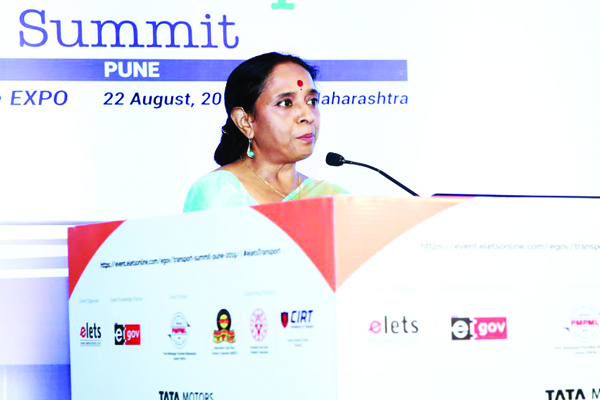
With the growing private-vehicle ownership in India, causing major congestion problems in cities, there are many plans to revamp the bus systems and metro networks, speaks Shuchi Sharma, Secretary, Higher & Technical Education, Government of Rajasthan, at the Elets National Public Transport Summit Pune. (Sharma was then serving as the Managing Director, Rajasthan State Road Transport Corporation.)
India, one of the fastest growing economies in the world, is achieving a growth rate of 7.5 percent per annum. With a growing population too, the country is working hard to transform itself over the next few decades. Even with the current size of the urban population, Indian cities are facing a multitude of issues such as severe congestion; deteriorating air quality; increasing road accidents; and an exploding growth in the number of private vehicles. Analysing the role of transport sector in the age of rapid urbanisation, Shuchi Sharma observed, “With the urban population projected to more than double in the next generation, improving public transportation is high on the agenda at the moment.”
Areas of Challenge

According to Sharma, public transport needs political will and strong action plan to improve its existing stature. Talking about the challenges, she opined, “The biggest challenge is finance. We should never measure efficiency of public transport organisations by its profit. Public transport should be treated like an infrastructure because it is facilitating the economy and livelihood. People are earning their livelihood through this lifeline.”
Sharing her experience of heading RSRTC, Sharma said, “While heading the RSRTC, I was faced with big challenges on all fronts; from financial to human resource front, to supply of parts and government policies and an overall insensitive mindset towards public transport. For me, these were the biggest challenges to run our organisation.” She also added, “Political uncertainties or change of politics every time with the change of ruling political party is what I feel to be the biggest challenge.”

Stating the striking contrast between the reality and perspective of managing the public transport sector, she stated, “Dealing with public transport does need a long term perspective that has a vision, planning and proper execution. But, somehow realities are different. There is a fundamental disagreement or contradiction when our commands change, as to who should run public transport.”
“While heading the RSRTC, I was faced with the biggest challenges on all front; from financial, to human resource front, to supply of parts, government policies and an overall insensitive mindset towards public transport.”
Need to Bridge the Gap
Leveraging IT can bridge the existing challenges. Pointing this out, she said. “The key point is to smartly allocate resources by utilising technology. Here, ICT helps. As the Integrated Traffic Management System generates lots of data, we need to utilise the data. By analysing these data, we can understand which routes are giving more profits and how to manage the finance.”
She added, “Digital payment is another rising area of opportunity in this sector. Use of ICT in our services for scheduling routes, tracking passengers and even the Human Resources of RSRTC, in terms of leave management.”
The Road Ahead
“India currently has been long committed on clean energy generation. The federal government too, has been reducing emissions from the transportation sector. Besides, in order to improve the efficiency of the organisation, the focus is on IT intervention, which in turn will provide seamless transport to the passengers, thus helping institutions to work in an efficient manner,” Sharma concluded.
Be a part of Elets Collaborative Initiatives. Join Us for Upcoming Events and explore business opportunities. Like us on Facebook , connect with us on LinkedIn and follow us on Twitter, Instagram.











